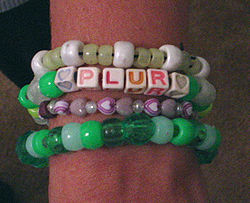
PLUR
Encyclopedia

Peace Love Unity Respect, commonly shortened with PLUR, is a credo
Credo
A credo |Latin]] for "I Believe") is a statement of belief, commonly used for religious belief, such as the Apostles' Creed. The term especially refers to the use of the Nicene-Constantinopolitan Creed in the Mass, either as text, Gregorian chant, or other musical settings of the...
or mantra
Mantra
A mantra is a sound, syllable, word, or group of words that is considered capable of "creating transformation"...
of the rave
Rave
Rave, rave dance, and rave party are parties that originated mostly from acid house parties, which featured fast-paced electronic music and light shows. At these parties people dance and socialize to dance music played by disc jockeys and occasionally live performers...
culture. Many in the rave scene have heard this term at some time or another, although its common usage is relatively recent. Early 1990s and mid-1980s raver
Raver
Raver or ravers may refer to:* Raver, Maharashtra, a city in India* Raver, a party-goer: in the 1960s and 1970s, a "party animal"; since the 1980s, more specifically an aficionado of raves...
s often followed similar principles as did the original hippie
Hippie
The hippie subculture was originally a youth movement that arose in the United States during the mid-1960s and spread to other countries around the world. The etymology of the term 'hippie' is from hipster, and was initially used to describe beatniks who had moved into San Francisco's...
generation, but did not use this coinage to describe their beliefs. It may be interpreted as the way that a raver believes he or she should live his or her life, and how people are expected to behave at a rave. This philosophy of the rave culture theoretically takes precedence over any chemical aspects of the rave scene.
PLUR can also be viewed as a more mainstream variant of its predecessor, PLE (Peace, Love, Ecstasy), because it removes the drug reference. PLE was mainly used in Europe in the early 1990s, when the rave scene became a youth subculture.
Defined
- PeacePeacePeace is a state of harmony characterized by the lack of violent conflict. Commonly understood as the absence of hostility, peace also suggests the existence of healthy or newly healed interpersonal or international relationships, prosperity in matters of social or economic welfare, the...
– Hostility typically serves no purpose other than to defend an ego that is lacking inner peaceInner peaceInner peace refers to a state of being mentally and spiritually at peace, with enough knowledge and understanding to keep oneself strong in the face of discord or stress. Being "at peace" is considered by many to be healthy and the opposite of being stressed or anxious...
. It is a common belief among the rave culture that violence is never the answer. - LoveLoveLove is an emotion of strong affection and personal attachment. In philosophical context, love is a virtue representing all of human kindness, compassion, and affection. Love is central to many religions, as in the Christian phrase, "God is love" or Agape in the Canonical gospels...
– Acts and feelings of goodwill towards all others. The exchange of gestures such as hugging can be seen in immense amounts at any rave; this being a way of "spreading the love." - Unity – We are all united in the human conditionHuman conditionThe human condition encompasses the experiences of being human in a social, cultural, and personal context. It can be described as the irreducible part of humanity that is inherent and not connected to gender, race, class, etc. — a search for purpose, sense of curiosity, the inevitability of...
. - RespectRespectRespect denotes both a positive feeling of esteem for a person or other entity , and also specific actions and conduct representative of that esteem. Respect can be a specific feeling of regard for the actual qualities of the one respected...
– A person must show regard for the feelings of others through their actions and inaction, and one must have respect for oneself and environment.
Origins
PLUR can find its roots in the mid '80s. There are several versions on the origin of the acronym and the adding of "Respect" to the "PLU"According to one legend, the term PLUR was coined by the DJ Frankie Bones
Frankie Bones
Frankie Bones is an American techno and house music disc jockey from New York City. He is best known for bringing the rave culture to the United States after playing at a hangar party in the UK during 1989...
in response to a fight that broke out while he was mixing and he stopped the show to say, "If you don't start showing some peace, love, and unity, I'll break your fucking faces." However it wasn't until later on, in discussions of the speech on the usenet
Usenet
Usenet is a worldwide distributed Internet discussion system. It developed from the general purpose UUCP architecture of the same name.Duke University graduate students Tom Truscott and Jim Ellis conceived the idea in 1979 and it was established in 1980...
newsgroup [news://alt.rave alt.rave], that "Respect" was added to the Peace, Love and Unity to create the now ubiquitous acronym PLUR.

